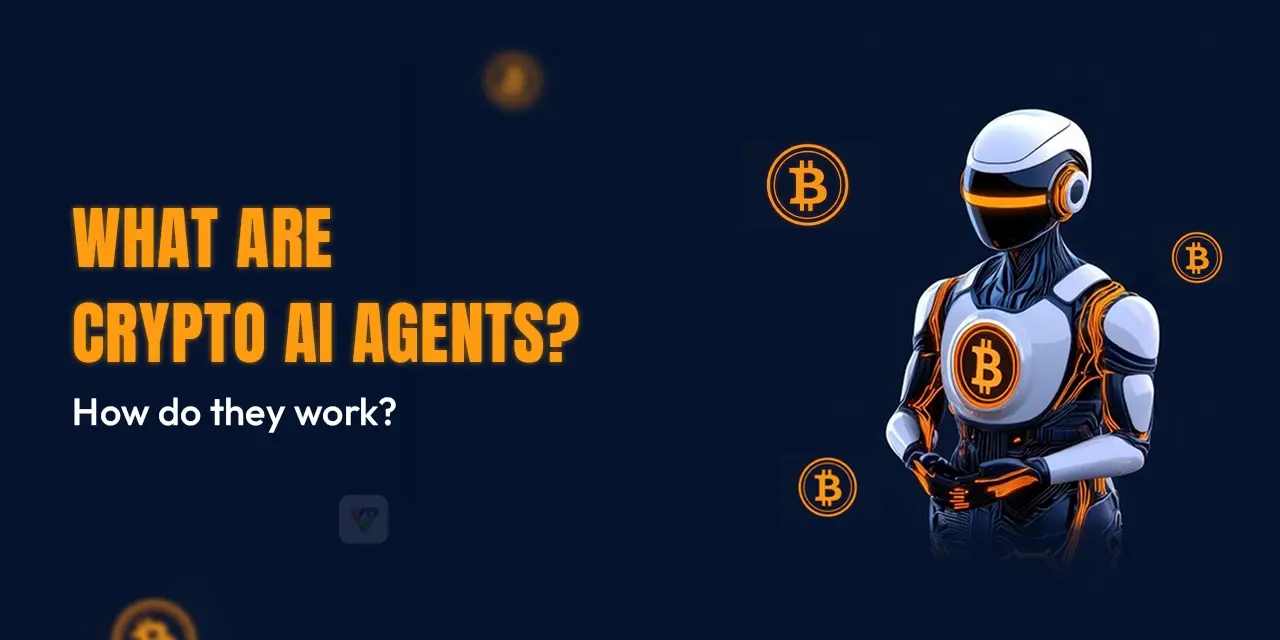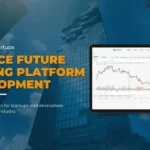The crypto universe has long had trading bots, arbitrage bots, and algorithmic-based tools. But crypto AI agents are a new breed. Autonomous, intelligent, learning, adaptive. They don’t just follow fixed rules. Instead,they observe, adapt, and make decisions based on data, sometimes using machine learning, sentiment analysis, smart contracts, etc. They may also be tightly integrated with crypto AI tokens that govern or reward their functioning.
With increasing interest in DeFi, NFT ecosystems, Web3, and AI, AI Agents Crypto is one of the fastest‑growing narratives. It’s becoming important not just for traders but for developers, protocol builders, and ordinary users who want automation and smarter financial tools.
Key Takeaways
- You’ll get exactly what are crypto AI agents, how they differ from traditional bots.
- Why AI agents crypto matter, what the risks are, and where things might go.
- By the end, you’ll not only understand this space but also see which top AI agents crypto projects are gaining traction.
What are Crypto AI Agents?
Crypto AI agents are automated software programs in blockchain that use machine learning to analyze the data and execute transactions. Key components often include:
- Data input: price feeds, charts, social media sentiment, and on‑chain data (e.g., token transfers, liquidity, smart contract states).
- Decision module: AI / ML algorithms that process signals, predict movement, or decide when to act.
- Acting module: smart contracts, bots that place trades, yield‑farming, staking, or interacting with DeFi protocols.
- Feedback/adaptation loop: learning from outcomes to adjust strategies.
These are what we call crypto AI agents. Some are fully autonomous (once deployed, they execute), some semi‑autonomous (humans supervise or approve). There are also crypto AI bots, which are simpler and follow pre‑defined algorithms without deeper learning or adaptability.
Key Features and Benefits
Why are so many people excited about crypto AI agents? What features set them apart, and what benefits do they deliver?
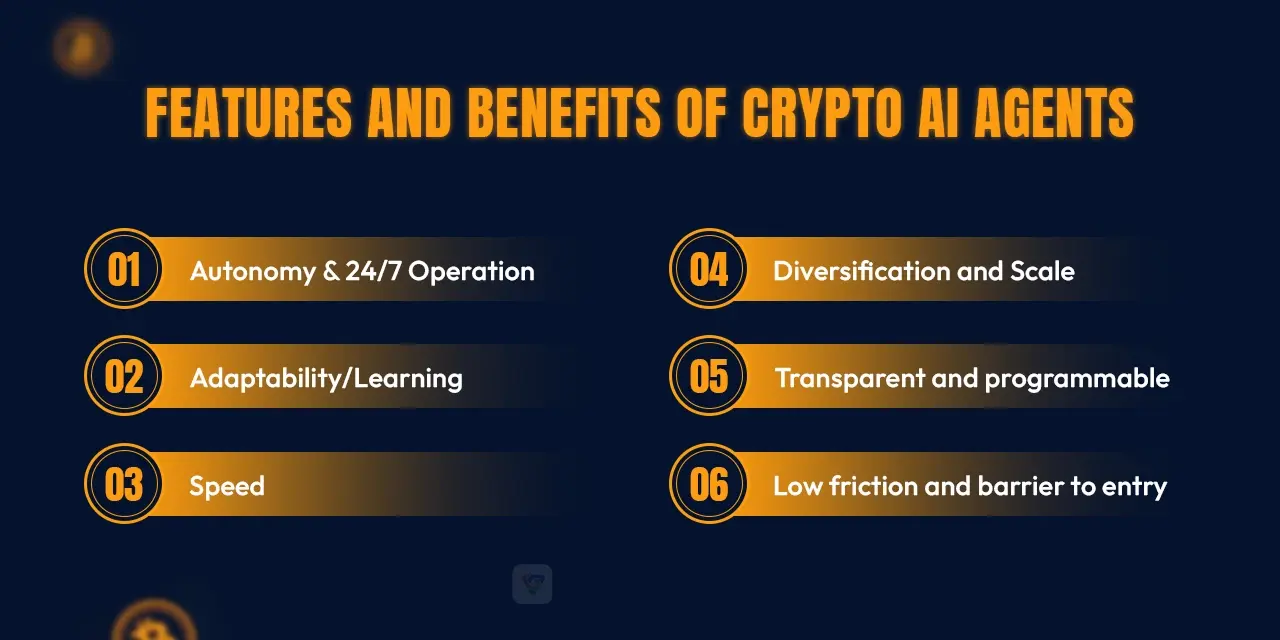
Autonomy and 24/7 operation
Unlike you or me, a crypto AI agent doesn’t sleep. Markets are global, run all day. These agents can monitor and act across time zones without fatigue.
Adaptability/learning
AI agents learn from past behavior, market conditions, and sentiment. They can adjust strategy when volatility spikes, when tokens dump, and when momentum shifts. Traditional bots are far more rigid.
Speed
Crypto AI agents act fast. If news breaks (say, regulators make an announcement), they can adjust positions, hedge, or shift flows before many humans even have their coffee.
Diversification and scale
They can manage multiple strategies, multiple tokens, and multiple chains. Some AI agent crypto tools allow users to deploy many sub‑agents focusing on different markets, niches, and risk profiles.
Transparent and programmable
With blockchain and smart contracts, you can sometimes inspect or audit what an agent is doing. Some crypto AI tokens are built to govern the agent (DAO style), and rewards or penalties can be built in.
Lower friction and barrier to entry
For non‑experts, a well‑built crypto AI agent/crypto AI bot can let users access smart trading, yield farming, or DeFi strategies without mastering every detail. This widens participation.
How do AI agents in Crypto work?
Peeling the curtain back, here’s how crypto AI agents generally work, step by step.
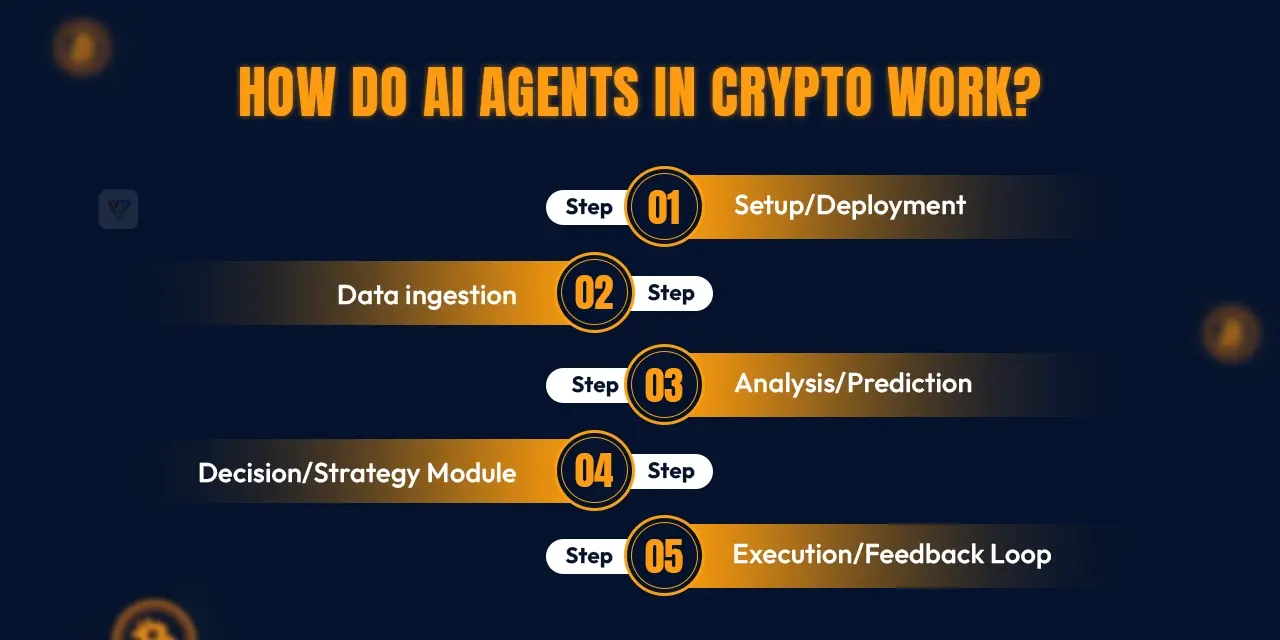
#1 Setup/Deployment
- Choose or build an agent (using a framework, a platform, or protocol that supports your agent).
- Provide permissions (wallets, smart contract access).
- Possibly stake or hold some crypto AI tokens if required by governance or reward mechanism.
#2 Data ingestion
- On‑chain data: token supply, liquidity pools, transaction volumes.
- Off‑chain data: news, social sentiment, macroeconomic indicators.
- Price feeds via oracles.
#3 Analysis / Prediction
- Use ML models: regression, reinforcement learning, LLMs (for natural language or sentiment).
- Pattern recognition: recognizing cycles, arbitrage opportunities, and mean reversion.
#4 Decision / Strategy module
- Pre‑defined strategy rules + adaptation.
- Risk management: stop‑loss, diversification, maximum drawdown.
- Handling multiple agents or strategies in parallel.
#5 Execution
- Trigger smart contract calls.
- Place trades via DEXs or CEXs (depending on design).
- Interact with DeFi protocols: staking, swapping, and providing liquidity.
#6 Feedback loop
- Measure performance (profits, losses, costs, slippage).
- Retrain / re‑optimize (if learning capable).
- Possibly governed by the community via crypto AI tokens or DAOs.
How AI Agents differ from Traditional bots?
It helps to contrast with traditional trading or automation bots. Many people confuse “crypto AI bot” and “AI agents crypto,” but there are big distinctions.
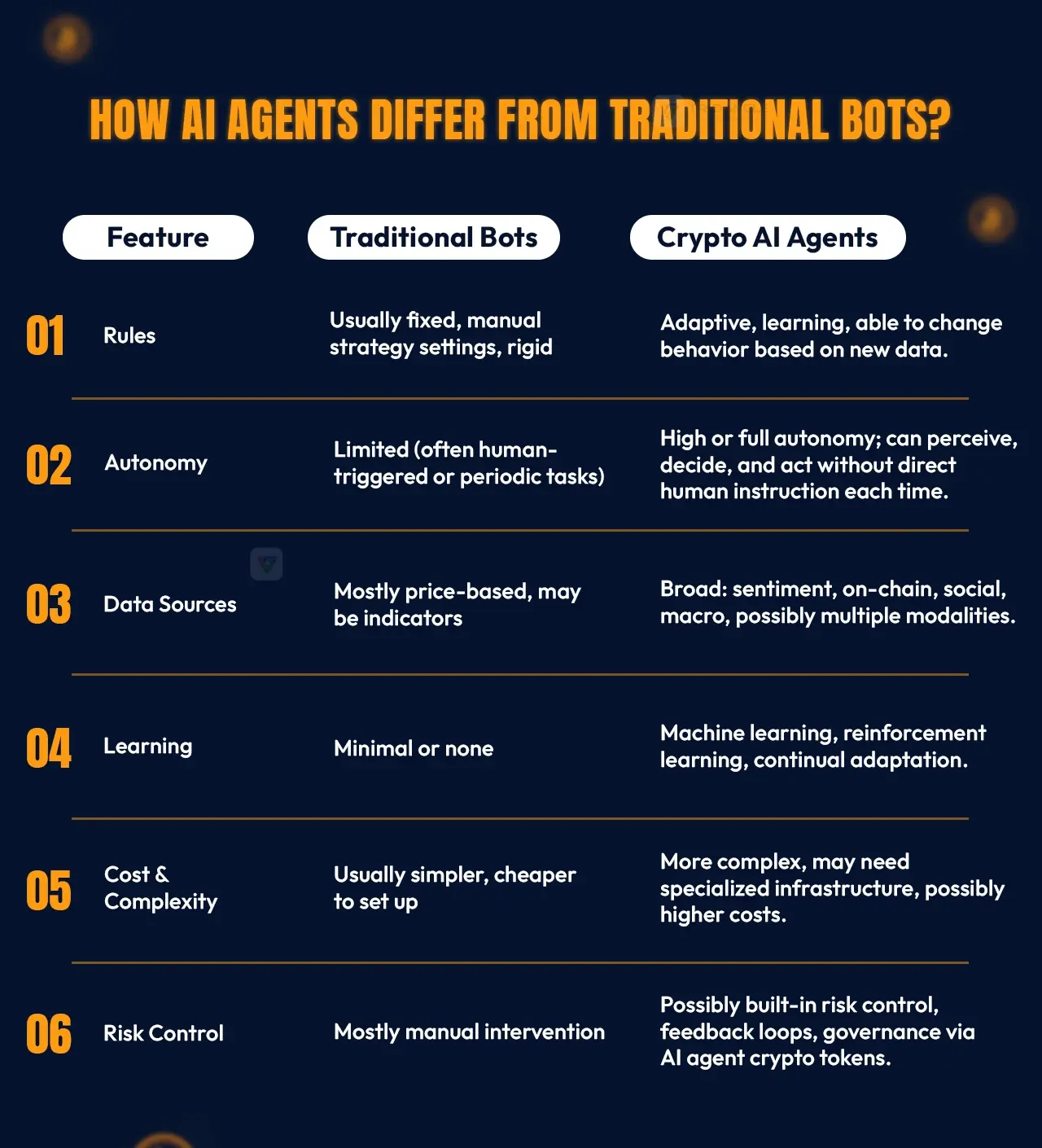
How secure are AI crypto agents?
Whenever something is autonomous and holds/controls funds, security becomes critical. Here are the aspects to consider and current realities.
- Smart contract risks: If your agent uses smart contracts (for executing trades, staking, etc.), those contracts must be audited. Bugs can lead to funds being lost or stolen.
- Data quality/oracle risks: Bad data (price feeds, sentiment data) can mislead an agent, causing wrong decisions.
- Adversarial inputs: Agents can be manipulated via fake news, social media pump‑and‑dump, or manipulated metrics.
- Regulatory risk: Some jurisdictions may arrest or penalize autonomous financial tools without proper licensing, especially if they resemble financial services. Use tokens or agents that are compliant where possible.
- Token risk/governance issues: If an agent is controlled via tokens (crypto AI tokens), the token governance model must be strong. Risks include rug pulls, token dumping, or centralization of power.
- Operational risk & cost: Gas fees, transaction costs, latency oracles, also the possibility of downtime, bugs in code.
Statistically speaking, even as interest in crypto AI agents is rising, many crypto AI tokens fail or lose value.
For example, one report found that ~88% of AI agent tokens are “dead” (no activity, no value) within a short time. Also, volatility is steep: market cap surges followed by large corrections. So, security and caution are necessary.
Types of Crypto AI Agents
Here are many types, with multiple examples, so you get a strong grasp of the variety out there.
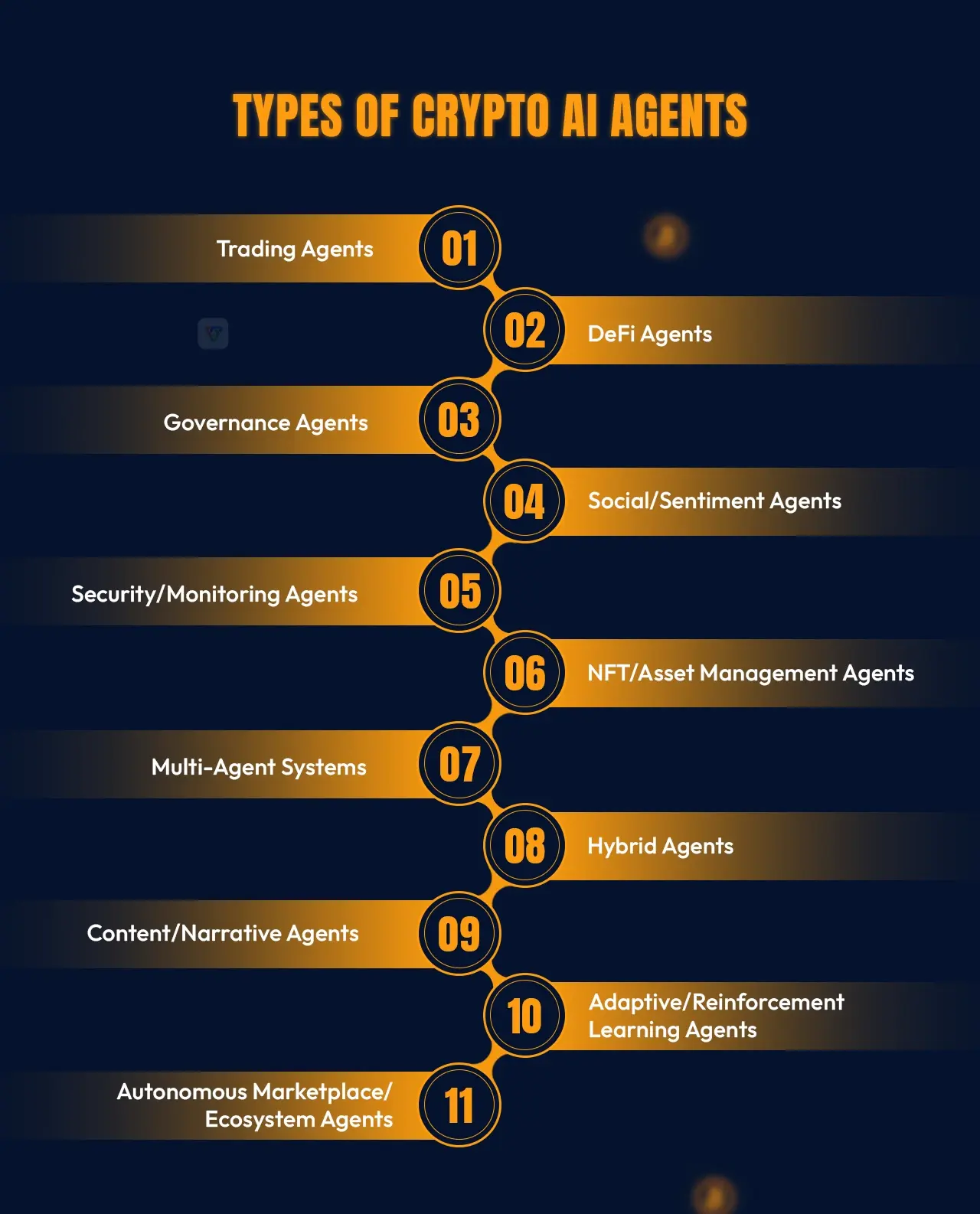
Trading Agents
These agents analyze price charts, volume, trend, and momentum, and perform automated trading. They may use reinforcement learning or algorithmic strategies. E.g., AI agent crypto coins that specialize in trading decisions, arbitrage bots, etc.
DeFi Agents
Agents that automate liquidity provision, staking, yield farming, and managing DeFi portfolios (auto rebalancing). Also, agents that interact with smart contracts to maximize returns.
Governance Agents
Agents that participate in DAO decision making, voting, proposals, and even submitting proposals automatically based on data signals or stakeholder inputs.
Social/Sentiment Agents
These monitor social media, news, sentiment, detect narrative shifts, or generate content. Some crypto AI agents are built around this, posting memes, responding to trends, etc.
Security/Monitoring Agents
Agents monitor on‑chain behavior for anomalies, vulnerabilities, or threats. For example, detecting malicious smart‑contract functions or alerting when suspicious transfers happen.
NFT/Asset Management Agents
Agents that manage NFT portfolios automatically buy/sell or flip based on rarity, floor price, or generative art value shifts. Or agents that manage cross‑asset portfolios, combining NFTs, DeFi, tokens, etc.
Multi‑Agent Systems/Hybrid Agents
Systems using multiple agents: one monitors, one trades, one manages risk, etc., coordinating together. They may share learning or feedback loops. A single AI agent crypto system may include several types of AI agents working in concert.
Content/Narrative Agents
Agents that generate content social posts, memes, art, audio based on crypto culture. These may influence narrative, hype, or drive community interaction. Some crypto AI tokens are tied to these narrative agents.
Adaptive/Reinforcement Learning Agents
Agents that change strategy dynamically via RL, learning from market feedback (profit/loss) over time. These are more sophisticated types of AI agents and often need more compute/data.
Autonomous Marketplace/Ecosystem Agents
Agents that manage entire marketplace behaviours. E.g., matching buyers/sellers, pricing, liquidity, and auctions operate continuously within a protocol.
Using multiple types of AI agents helps build richer ecosystems. For example, a system could combine a trading agent, risk agent, sentiment agent, and governance agent to create a robust protocol.
Use Cases of AI Agents in Crypto
Let’s look at real examples and trends of what are crypto AI agents being used for, and which are some top AI agents crypto and AI agent crypto coins gaining attention.
- Automated trading and market‑making
Agents monitor multiple exchanges, DEXs, and arbitrage opportunities, and execute trades when profitable windows appear. - Portfolio allocation and rebalancing
Agents that adjust portfolio weights across assets/chains, reduce risk, and capture yield. - DeFi autopilot (staking, yield farming, auto compounding)
Some AI agents automatically move funds among protocols to optimize returns, without manual changing of positions. - Governance participation
Agents vote on proposals, even suggest or create proposals, sometimes based on policy frameworks or community inputs. - Sentiment and narrative tracking
Detecting trending topics, shifts in social signals (tweets, Reddit, etc.), triggering actions (e.g., buy tokens, produce content, hedge). Some crypto AI agents generate content to influence narrative. - Security/Monitoring
Monitoring smart contracts for vulnerabilities; detecting front‑running, flash‑loan attacks; alerting users. - NFT management
Automatically snapping up undervalued NFTs, floor sweeping, managing gas costs, and optimizing asset mix.
Top AI agents in Crypto
Here are examples of top AI agents crypto projects, or crypto AI tokens that are visible as of mid‑2025.
- AI16Z (AI16Z): A DAO that uses AI agents to manage investments and strategies. It has been one of the high performers in the AI agents market.
- Virtual Protocol (VIRTUAL): Frequently cited among projects driving the AI agents in the market.
- AIXBT: Seen in metrics for crypto AI agents, especially in the recent 30‑day performance stats.
- Zerebro: Known for content/narrative agents, meme posts, and cross‑chain content.
Recent Trends & Stats
- Market Cap Surge: The market cap for crypto AI agents surged by 222% in Q4 2024 (from ~$4.8B to ~$15.5B), driven largely by Solana‑based projects.
- On‑chain Activity & Funding: In 2025, AI agent projects raised about $1.39 billion, a ~9.4% increase over the whole of 2024. On‑chain activity jumped 86%, with an estimated 4.5 million daily unique active wallets now interacting with AI dApps.
- Market Share: AI on‑chain dominance grew from 9% at the start of 2025 to ~19% mid‑year, putting it just behind blockchain gaming in terms of usage in the Web3 ecosystem.
- Regional Usage: Europe (about 26.2%) and Asia (≈ 21.9%) are among the top regions for engaging with AI dApps. North America is around 15.8%.
- Token Survival & Risk: The drop‑off is steep. A report found that ~88% of AI agent tokens become “dead” (little or no activity, value) soon after launch. Average lifespan in many cases is short (a few weeks).
Source: Cointelegraph
How Much Does it Cost to Use AI Crypto Agents?
Cost is a big factor, and it comes from multiple fronts. Here’s what to expect when using crypto AI agents or crypto AI bots:
- Upfront token costs/staking/governance: Many agents require you to hold or stake crypto AI tokens to access premium features/service or governance. That means exposure to token volatility.
- Transaction/gas fees: On‑chain actions cost gas. If your agent trades often, compounds, moves between chains, or uses DeFi heavily, gas can eat into profits.
- Compute/subscription costs: For AI‑agent platforms, you may pay subscription fees or a share of returns. More complex agents (with ML, multiple data feeds) cost more to host/maintain.
- Slippage/fees on exchanges: When the agent executes trades or moves liquidity, slippage matters. Also, fees for using DEXs or CEXs, and performance fees if the agent earns profits.
- Opportunity cost/risk premium: If the agent misbehaves or underperforms, you could lose more than simple manual misentries. And many crypto AI tokens drop fast.
In practice, costs vary greatly. From a small subscription or single token holding to full fees, transaction costs, and risk of loss. Before using a crypto AI agent, people commonly simulate or backtest to gauge profitability.
Challenges in Using Crypto AI Agents
The potential is huge and also the challenges.
- Volatility & High Risk
As the stats show, many AI agent tokens become inactive or lose value. Gains can be spectacular or crushing. The crypto AI agents market has seen huge growth with sharp corrections. - Hype and Speculation
There’s a lot of buzz. AI agent crypto, crypto AI agents, and AI crypto bots are trending. And the projects sometimes use them as marketing hooks without real substance. Some projects are shallow “wrappers” that use AI buzz without delivering. - Security Vulnerabilities
Agents are only as good as their code and data. Bad oracles, smart contract exploits, and governance failures are real. Users must trust teams and audits. - Regulatory and Legal Unknowns
Since autonomous trading, automated decision‑making touch finance, law, and regulation, agents may run afoul of securities law, tax obligations, or licensing. Rules differ across countries. - Data quality / adversarial attack risks
If sentiment agents are misled by false information or price feed oracles are manipulated, agent decisions may be wrong. - Computational & Infrastructure Costs
Complex types of AI agents like adaptive learning, multi‑agent systems require more compute, data storage, bandwidth, and latency control. Not cheap. Efficient infrastructure is required. - Adoption & Usability
For everyday users, deploying or trusting an agent can feel risky. Interfaces, UX, transparency, and cost all matter. If a crypto AI bot or agent doesn’t clearly show what it’s doing, many users avoid it.
Future of Crypto AI Agents
Looking ahead, here’s what seems likely in this space. The future of crypto AI agents is exciting. However, it will require maturation.
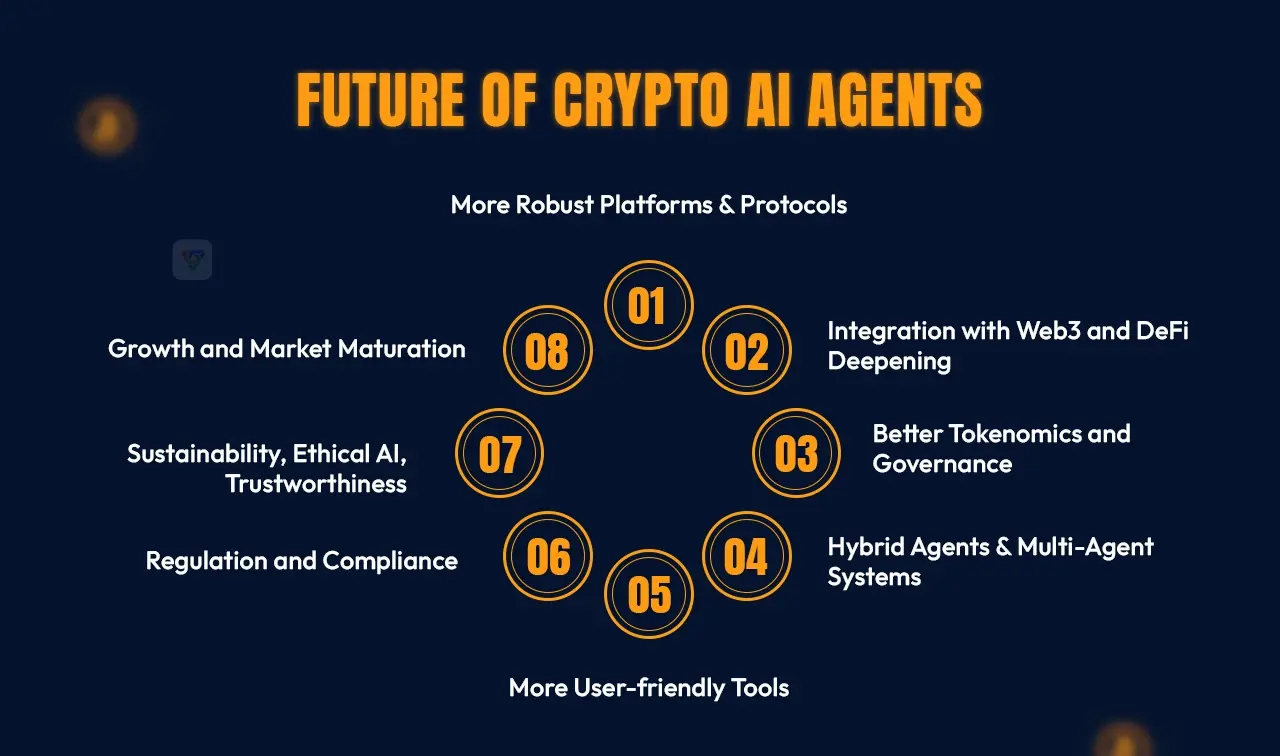
- More Robust Platforms & Protocols
Protocols that make deploying AI agents easier, with built‑in security, governance, and risk control. More standards for audits, interoperability across chains. - Integration with Web3 & DeFi deepening
DeFi + AI = “DeFAI” is already talked about. Agents that can seamlessly move assets, stake, borrow, lend, and optimize across chains. Users will expect cross‑chain capability. - Better Tokenomics and Governance
More crypto AI tokens that govern agents (or communities thereof), better models for rewards, penalties, transparency, and redeemability. DAOs that manage agent behavior. - Hybrid Agents & Multi‑Agent Systems
As noted in “types of AI Agents”, systems combining trading, sentiment, and risk agents will outperform single‑purpose ones. Agents cooperating or coordinating might set trends. - More User‑Friendly Tools
Better dashboards, safer defaults, simulations, and visualizations. Non‑experts can see what the agent is doing, adjust or stop it. It lowers the barrier to entry. So, crypto AI agents aren’t just for high‑end users or speculators. - Regulation & Compliance
Expect increasing regulatory attention and especially for larger agents or those aggregating user funds. KYC, AML, and licensing could matter. Agents may need to embed compliance features. - Sustainability, Ethical AI, Trustworthiness
Handling bias, avoiding overfitting, being transparent, making agents fair, and avoiding misuse. Example: market manipulation, misinformation via narrative agents. Trust mechanisms (immutable logs, audits) will be vital. - Growth & Market Maturation
Based on forecasts and current growth, the crypto AI agents market could grow substantially. Some analyses suggest the AI agent market was ~$5 billion in 2024 and could grow many‑fold by 2030.
Conclusion
So, what are crypto AI agents? Fundamentally, they are the next evolution beyond simple bots. Autonomous, adaptive, intelligent programs sitting at the intersection of AI and blockchain. They analyze, act, learn, and often rely on crypto AI tokens or governance models. They promise efficiency, scale, automation, and tremendous opportunity. But with opportunity comes risk, with market failures, security holes, and regulatory unknowns.
If you’re considering using or investing in a crypto AI agent or crypto AI bot, here are some quick takeaways.
- Check track record: how long running, past performance.
- Scrutinize tokenomics and governance of associated crypto AI tokens.
- Understand the types of AI agents involved in a project. Are they just hype, or real learning/adaptive agents?
- Know your costs: gas, fees, subscriptions, risk of loss.
- Be prepared for volatility. The sector is hot now. But many tokens fade quickly.
For those who do this well, crypto AI agents are likely to reshape how people trade, invest, use DeFi, and manage crypto portfolios. As the market matures, the winners will be those with solid tech, trustworthy governance, transparent operations, and real utility, not just marketing hype.

